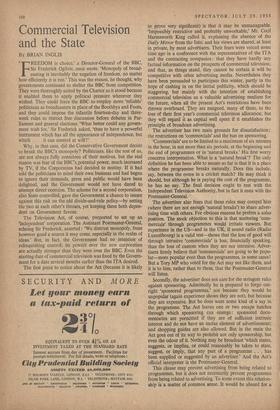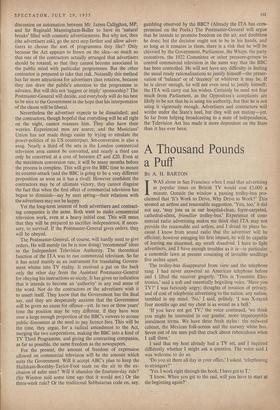Commercial Television and the State
By BRIAN INGLIS REEDOM is choice,' a Director-General of the BBC, Sir Frederick Ogilvie, once wrote. 'Monopoly of broad- casting is inevitably the negation of freedom, no matter how efficiently it is run.' This was the reason, he thought, why governments continued to shelter the BBC from competition. They were thoroughly suited by the Charter as it stood because it enabled them to apply political pressure whenever they wished. They could force the BBC to employ more 'reliable' politicians as broadcasters in place of the Boothbys and Foots, and they could impose the infantile fourteen-day and three- week rules to restrict free discussion before debates in Par- liament and general elections. 'What better could any govern- ment wish for.' Sir Frederick asked, 'than to have a powerful instrument which has all the appearance of independence, but which . . it can control at will?'
Why, in that case, did the Conservative Government decide to break the BBC's monopoly? Politicians, like the rest of us, are not always fully conscious of their motives, but the real reason was fear of the BBC's,potential power, much increased by TV, if the Corporation had decided to mutiny. If it had told the politicians to mind their own business and had begun to ignore their demands, press and public would have been delighted, and the Government would not have dared to attempt direct coercion. The scheme for a second corporation. also State controlled, gave the Government a chance to insure against this risk on the old divide-and-rule policy—by setting the two at each other's throats, yet keeping them both depen- dent on Government favour.
The Television Act, of course, purported to set up an `independent' corporation. The Assistant Postmaster-General, echoing Sir Frederick, asserted : `We distrust monopoly, from however good a source it may come, especially in the realm of ideas.' But, in fact, the Government had no intention of relinquishing control; its powers over the new corporation are actually stronger than they were over the BBC. Even the starting date of commercial television was fixed by the Govern- ment for a date several months earlier than the ITA desired.
The first point to notice about the Act (because it is likely to prove very significant) is that it may be unmanageable. `Impossibly restrictive and probably unworkable,' Mr. Cecil Harmsworth King called it, explaining the absence of the Daily Mirror from the lists; and his views are shared, at least in private, by most advertisers. Their fears were voiced some time ago in a conference with the representatives of the ITA and the contracting companies : that they have hardly any factual information on the prospects of commercial television; and that, as things stand, they cannot be certain it will be competitive with other advertising media. Nevertheless they have been persuaded to participate this winter, partly in the hope of cashing in on the initial publicity, which should be staggering, but mainly with the intention of establishing commercial television as a valuable advertising medium for the future, when all the present Act's restrictions have been thrown overboard. They are resigned, many of them, to the loss of their first year's commercial television allocation; but they will regard it as capital well spent if it establishes the principle of broadcast advertising.
The advertiser has two main grounds for dissatisfaction : the restrictions on 'commercials' and the ban on sponsoring.
`Commercials' are to be limited to a maximum of six minutes in the hour, in not more than six periods, at the beginning and the end of programmes or in 'natural breaks.' His first worry concerns interpretation. What is a 'natural break'? The only definition he has been able to secure so far is that it is a place where the programme breaks naturally. Does this include, say, between the overs in a cricket match? lie may think it should, but although he is paying the cost of the programme. he has no say. The final decision ought to rest with the Independent Television Authority, but in fact it rests with the Postmaster-General.
The advertiser also fears that these rules may compel "him (where there are not enough 'natural breaks') to share adver- tising time with others. For obvious reasons he prefers a so/us position. The stock objection to this is that scattering 'com- mercials' through programmes would irritate viewers. But experience in the US—and in the UK, if sound radio (Radio Luxembourg) is a valid test—shows that the loss of good will through intrusive 'commercials' is less, financially speaking, than the loss of custom when they are not intrusive. Adver- tisers firmly believe that `commercials' are going to be popu- lar—more popular even than the programmes, in some cases! But a Tory MP who voted for the Act may not like them, and it is to him, rather than to them, that the Postmaster-General will listen.
Secondly, the advertiser does not care for the stringent rules against sponsoring. Admittedly he is prepared to forgo out- right 'sponsored programmes,' not because they would be unpopular (again experience shows they are not), but because they are expensive. But he does want some kind of a say in the programme. The Act leaves one or two escape hatches through which sponsoring can emerge : sponsored docu- mentaries are permitted if they are of sufficient intrinsic interest and do not have an undue element of advertisement; and shopping guides are also allowed. But in the main the Act goes out of its way to prohibit not only sponsorship, but even the odour of it. Nothing may be broadcast 'which states, suggests, or implies, or could reasonably be taken to state, suggest, or imply, that any part of a programme . . . has been supplied or suggested by an advertiser.' And the Act's official interpreter is the Postmaster-General.
This clause may prevent advertising from being related to programmes, but it does not necessarily prevent programmes from being related to advertising. To some extent this relation- ship is a matter of common sense. It would be absurd for a discussion on automation between Mr. James Callaghan, MP, and Sir Reginald Manningham-Buller to have its 'natural breaks' filled with cosmetic advertisements. But why not, then (the advertisers ask), go the next step farther and allow adver- tisers to choose the sort of programmes they like? Only because the Act appears to frown on the idea—so much so that one of the contractors actually arranged that advertisers should be rotated, so that they cannot become associated in the public mind with particular programmes. But the other contractor is prepared to take that risk. Naturally this method has far more attractions for advertisers than rotation, because they can draw the public's attention to the programme in advance. But will this not 'suggest or imply' sponsorship? The Postmaster-General will decide, and everybody will do his best to be nice to the Government in the hope that his interpretation of the clause will be liberal.
Nevertheless the advertiser expects to be dissatisfied; and the contractors, though hopeful that everything will be all right on the night, cannot reassure him. They also have their worries. Experienced men are scarce; and the Musicians' Union has not made things easier by trying to emulate the power-politics of its US counterpart. Set-conversion is also a snag. Nearly a third of the sets in the London commercial television area cannot be converted, and nearly a third can only be converted at a cost of between £7 and £20. Even at the maximum conversion rate, it will be many months before the process is complete. This will give the BBC time to mount its counter-attack (and the BBC is going to be a very different proposition as soon as it has a rival). However confident the contractors may be of ultimate victory, they cannot disguise the fact that when the first effect of commercial television has begun to diminish—say by next spring—their relations with the advertisers may not be happy.
Yet the long-term interest of both advertisers and contract- ing companies is the same. Both want to make commercial television work, even at a heavy initial cost. This will mean that they will be prepared to sacrifice independence, if neces- sary, to survival. if the Postmaster-General gives orders, they will be obeyed.
The Postmaster-General, of course, will hardly need to give orders. He will merely (as he is now doing) 'recommend' ideas to the Independent Television Authority. The theoretical function of the ITA was to run commercial television. So far it has acted mainly as an instrument for translating Govern- ment whims into TV reality. It received a pat on the back only the other day from the Assistant Postmaster-General for obeying his instructions so nicely. It has given no indication that it intends to become an 'authority' in any real sense of the word. Nor do the contractors or the advertisers wish it to assert itself. They know that the Government has the final say, and they are desperately anxious that the Government will be given no cause for offence—yet. In two or three years' time the position may be very different, if they have won over a large enough proportion of the BBC's viewers to arouse public discontent at the need to pay licence fees. This will be the time, they argue, for a radical amendment to the Act, merging the two corporations, making the BBC into a kind of TV Third Programme, and giving the contracting companies, as far as possible, the same freedom as the newspapers.
For the present, the amount of freedom of expression allowed on commercial television will be the amount which suits the Government. Will it accept ABC's plan to keep the Hailsham-Boothby-Taylor-Foot team on the air to the ex- clusion of safer men? Will it abandon' the fourteen-day rule? (Sir Winston said some time ago that it would not.) Or the three-week rule? Or the traditional Sabbatarian code on, say, gambling observed by the BBC? (Already the ITA has com- promised on the Pools.) The Postmaster-General will argue that he intends to promote freedom on the air, and doubtless he does; but the decision ought not to be in his hands, and so long as it remains in them, there is a risk that he will be chivvied by the Government, Parliament, the Whips, the party executives, the 1922 Committee or other pressure-groups to control commercial television in the same way that the BBC has been controlled. He will not have any difficulty in finding the usual ready rationalisations to justify himself—the preser- vation of 'balance' or of 'decency' or whatever it may be. If he is clever enough, he will not even need to justify himself; the ITA will carry out his wishes. Certainly he need not fear much from Parliament, as the Opposition's complaints are likely to be not that he is using his authority, but that he is not using it vigorously enough. Advertisers and contractors will writhe under the State's heel, but they will not mutiny—yet. So far from helping broadcasting to a state of independence. the Television Act has made it more dependent on the State than it has ever been.



































 Previous page
Previous page